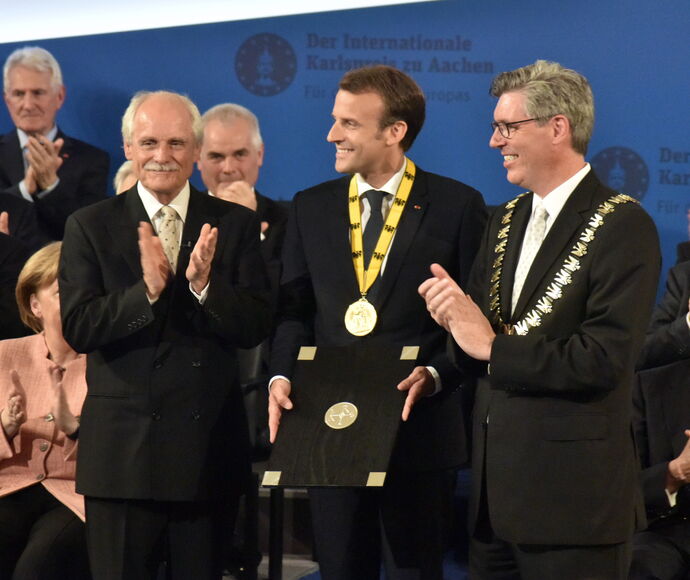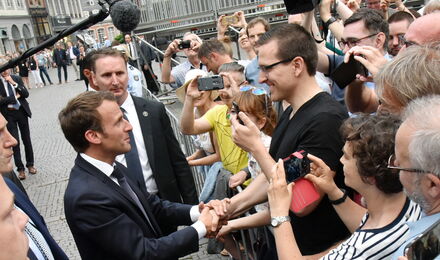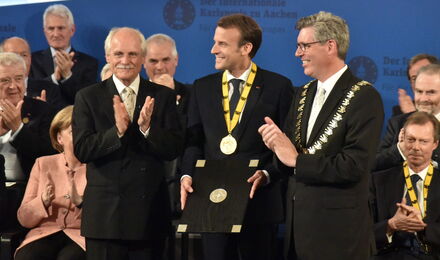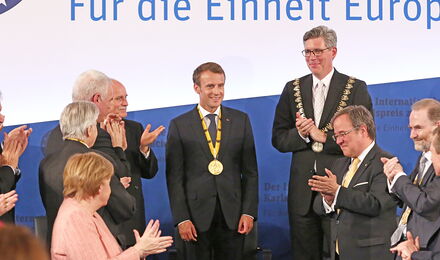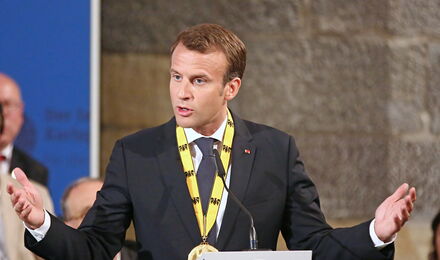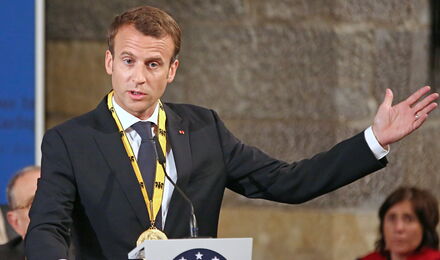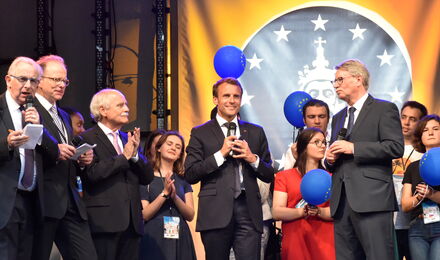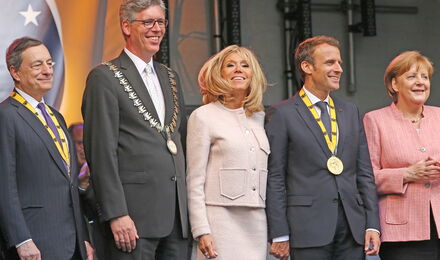I.
In 2018, the Society for the Conferring of the International Charlemagne Prize of Aachen honours the President of the French Republic, Emmanuel Macron, for his vision of a new Europe and the refoundation of the European project, of a new European sovereignty and of a close, newly structured cooperation between peoples and nations. His passion and commitment to Europe, his advocacy of cohesion and commonality and his resolute fight against all forms of nationalism and isolationism are exemplary, groundbreaking and inspiringly contagious in overcoming the European crisis. With Emmanuel Macron, the Society of the International Charlemagne Prize honours a courageous pioneer for the renewal of the European dream.
At the same time, the Charlemagne Prize Society hopes and wishes, along with many European citizens, that the 2018 Charlemagne Prize winner's proposals will inspire his European partners and contribute to a sustainable renewal of the European project.
At the end of a highly charged European election year, which was largely characterised by the confrontation with populists, radicals and nationalists, one date stands out: 7 May 2017. The election of Emmanuel Macron as President of the French Republic has once again impressively demonstrated that Europe can inspire.
More aggressively than almost any other person, Macron has put the European idea at the centre of his political commitment; more aggressively than almost any other person, he has sought to engage with those who want to call into question the project to which our continent owes the longest period of peace in its history; and more aggressively than almost any other person, he is setting the tone for the further development of the EU with ambitious proposals for ‘the re-establishment of a sovereign, united and democratic Europe’ – because, as he is convinced, “we should be receptive again to wanting to write great history”.
Macron is not concerned with institutional minutiae; he is much more concerned with the fundamental issues, with the great European narrative, with which he wants to win people over to the unification project again: ‘The problem is that debates about Europe have become arguments between experts and lawyers. Yet Europe was conceived above all as a political project! The EU was not founded by experts, nor by diplomats. It was created by people who had learnt from the drama of our shared history. I propose a new beginning, and one that doesn't start by deliberating endlessly over what instruments are needed for it – but one that should be thought of in terms of the goal. What do we want? What should our Europe look like? I want to renew the European dream, I want to reawaken the ambitions for it. (Der Spiegel 42/17)’
Macron asserts his firm belief ‘that modern political life must rediscover the sense of the symbolic’. This is the background to the unique scene of the newly elected French president, who walks through the courtyard of the Louvre not to the Marseillaise, but to the strains of the European anthem, to address his supporters and underline France's firm commitment to the European Union.
II.
Emmanuel Macron was born on 21 December 1977 in Amiens, where he grew up and attended the Jesuit-run Lycée La Providence. He later transferred to the Lycée Henri IV in Paris, where he graduated with a baccalaureate. He then studied philosophy at the University of Paris-Nanterre and political science at the Institut d'études politiques (Sciences Po). From 1999 to 2001, he worked as an assistant to the renowned philosopher Paul Ricœur. He then completed the ENA in Strasbourg between 2002 and 2004 before joining the French tax police.
In 2008, he joined the private bank Rothschild & Cie. as an investment banker, becoming a partner two years later. After François Hollande's election victory, the non-partisan Macron (who left the Socialist Party after only a short period of membership) joined his advisory staff at the Elysée Palace in May 2012 and became deputy secretary general of the presidential administration. In August 2014, Macron was appointed Minister for Economic Affairs, Industry and Digital Economy in the government.
After he had already proclaimed the ‘En Marche!’ movement in Amiens in April 2016, with which he wants to appeal to broad sections of the population, break up entrenched political structures and overcome the camp thinking in terms of right and left, he resigned from the ministerial office at the end of August 2016 and announced in mid-November of the same year that he would run for the presidency as an independent candidate.
‘You can win elections if you have an idea of Europe and defend it,’ Macron declared at the start of his campaign. And true to his conviction that the Franco-German relationship is the basis for the “European momentum”, in January 2017 he promoted his ideas for a renewal of Europe at Berlin's Humboldt University, as many great Europeans before him had done.
‘Ensuring security against external threats [...] is a prerequisite and the innermost core of any sovereignty of states. This therefore applies to the EU as a community of states in the sense that they can only maintain sovereignty through the community,’ he said in Berlin, quoting from the 1994 Schäuble/Lamers paper, thus defining his core concept.
He would subsequently define sovereignty in more detail and make it the focus of his many speeches and articles. This is because, Macron is convinced, sovereignty in today's world can only be secured by the European Union, not by the nation state.
Macron is turning the French presidential election campaign into a referendum for Europe.
‘If you are a timid European, you are already a defeated European,’ he says, aggressively taking on the opponents of Europe; and while some lament that political positions in European democracies are becoming more and more similar and that voters lack clear alternatives, the runoff vote for the office of French head of state pits two candidates against each other who could not be more opposed in their fundamental convictions and election programmes.
Macron's campaign includes a people-oriented Europe, a common economic policy and an EU finance minister, the strengthening of the euro and a European investment programme. His pro-European stance is opposed to the re-nationalisation of his country, and thus also to the nationalist and populist tendencies in the rest of Europe.
The election on 7 May 2017, which Emmanuel Macron won by an overwhelming majority, is also seen as a fateful choice, not only in France but also in large parts of the EU. With over 66 per cent of the vote, the 39-year-old is elected the eighth (and youngest) president of the French Republic.
III.
On the day after he takes office, his first official visit abroad takes him to Germany, where he and the Chancellor agree to intensify Franco-German cooperation at both the bilateral and pan-European level. The close partnership, which Macron regards not only as a necessary condition for Europe's success, but also as ‘an actual work ethic’, is already evident at the jointly prepared European Council on 23 June 2017, the results of which the Chancellor and the French President evaluate in a joint final press conference. With important results on climate protection, the fight against terrorism and a common security and defence policy, the summit sends a signal of drive, but above all a signal of new dynamism and confidence.
Macron had already outlined the main features of his thoughts on the future of the EU in the French election campaign and in his Humboldt Lecture. Two days after the German parliamentary elections, he took the ‘Initiative for Europe’ at the Sorbonne in Paris on 26 September 2017. For too long, he criticises, ‘we were sure that the past would not catch up with us again, [...] we thought that we could settle into inertia, into habit, that we could lose sight of this goal a little, this hope that should carry Europe, because it had become a matter of course, the thread of which we had lost.’ For too long, he said, Europeans had allowed Brussels to be portrayed as a powerless bureaucracy. ‘In doing so, we forget that we are Brussels, always! We haven't proposed anything more, we haven't wanted to.’ But ‘I am not leaving anything to those who promise hatred, division or national isolation. I am not leaving them a single proposal. It is up to Europe to make proposals. It is up to us to support them, now and immediately.’
What follows is a comprehensive, sometimes very specific and above all passionate plea for the ‘refounding of a sovereign, united and democratic Europe’. No state can successfully meet the challenges of a globalised world alone. For Macron, the key to sovereignty lies much more in European cooperation, in a Europe that
- guarantees security in all its dimensions, in defence, in the fight against terrorism as well as in civil protection,
- responds to the challenge of migration with a common border security and a common asylum authority as well as an integration programme;
- focuses its foreign policy on the Mediterranean region and a new partnership with Africa,
- stands for sustainable development in energy and environmental policy,
- which does not simply accept the digital revolution, but shapes it in a leading way,
- and in the Eurozone as the centre of Europe's economic power, stabilised by national reforms, but also by the coordination of economic policies and a common budget.
Fiscal and social convergence, the reform of the Posting of Workers Directive, the introduction of a European financial transaction tax, transnational lists for European elections, the reduction in the size of the Commission – Macron is all too aware that many of his detailed proposals will provoke controversy. And he is inviting discussion himself, indeed he is demanding it, not only at the governmental level but also among the general public: ‘We need to refound the European project through and with the people [...] That is why, if we want to move forward again, I would like us to do so through democratic conventions that are an integral part of the refoundation of Europe. Once we have defined the simple terms of a roadmap that is supported by the major governments that are willing to move in this direction, I would like to see us organise a major debate over the next year in all countries that wish to participate, based on a common set of questions to determine the priorities, concerns and ideas for our roadmap for tomorrow's Europe.’
With a view to the 55th anniversary of the Elysée Treaty in January 2018, he invites Germany to a ‘new partnership’; because ‘on all these issues that I have raised, we can provide decisive and concrete Franco-German impetus’.
Macron is a leader with a European claim to leadership.
At the EU summit in Tallinn at the end of September 2017, he launched a group of ‘Friends of the Refoundation of Europe’. He called on all member states to participate in enhanced integration. However, he also made it clear that the unwilling countries must not be allowed to hold back those willing to reform. Instead, a roadmap and a method should be developed on which those willing to reform can agree.
At the beginning of October, he makes a proposal to partially defuse one of the most difficult chapters of European understanding: refugee policy. He announced that France would take in 10,000 refugees from UN camps around Syria and from Africa within two years. He called on other EU countries to follow this example, saying that this was the best way to fulfil Europe's humanitarian obligation, to select those who are truly in need of help while at the same time controlling the level of immigration.
On 10 October 2017, at the Goethe University in Frankfurt, the French head of state reiterates his initiative for a renewed European sovereignty and emphasises the importance of culture and education as ‘the best cement in the EU’. It is important to show every child in Europe a horizon, to strengthen education as an antidote to the malaise of European civilisation and to protect against the trials and tribulations of populist tendencies, above all to improve future opportunities for children from socially disadvantaged backgrounds.
‘We don't have to go to the doctor because we have a vision,’ but rather ’ask ourselves what we want to do together.’
President Macron wants to re-anchor Europe in the hearts of the people.
IV.
It is not only the content of the proposals that has attracted so much public attention; it is the confidence and fighting spirit, the visionary imagination and, above all, the passion that has long been sorely missed in the member states, with which Macron is seizing the initiative for Europe and giving the reform debate new momentum.
It is the same passion that characterises him, with which the French president demands far-reaching and difficult reforms from his fellow countrymen – and with which he places himself at the forefront of those seeking to advance climate protection at the international level.
‘We all share the same responsibility: make our planet great again.’ When US President Donald Trump announced the United States‘ withdrawal from the Paris climate agreement, it was Macron who, in a statement from the Elysée Palace delivered in fluent English, formulated the Europeans’ response and at the same time invited all the scientists, engineers and entrepreneurs who had been disappointed by Trump's decision to continue working together, offering them France as a second home.
In November 2017, at the UN Climate Change Conference in Bonn, he was more specific, setting out targets for Europe and speaking out in defence of the IPCC, which was under threat due to the US withdrawal: ‘I would therefore like Europe to take the place of the Americans and say here today that France will be there. I want as many European countries as possible to join us in making up for the loss of American funding. I can already guarantee that from 2018 the IPCC will not lack a single cent to function, to move forward and to constructively support our decisions.’
V.
At a time when our continent is facing crucial decisions, Emmanuel Macron has taken up the fight for Europe with passion and courageous optimism, showing that and how a clear commitment to common ground can win over citizens for a renewal of the European dream. In his short time in office, Emmanuel Macron has given Europe new inspiration and given new impetus and dynamism to the debate on a deeper union of our continent.
In awarding the 2018 International Charlemagne Prize to the President of the French Republic, the Board of Directors of the Society for the Conferring of the International Charlemagne Prize honours and encourages a beacon of hope for a new chapter in the European success story.




